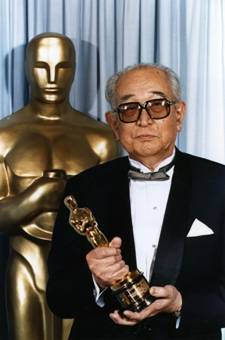
 Akira
Kurosawa (1910-1998), Japanese motion-picture director, known worldwide
for the variety and visual beauty of his films. Influenced by American
directors John Ford, William Wyler, and Howard Hawks, and inspired by
Western literary classics and popular culture, Kurosawa made films with
strong story lines that appeal to a wide audience.
Akira
Kurosawa (1910-1998), Japanese motion-picture director, known worldwide
for the variety and visual beauty of his films. Influenced by American
directors John Ford, William Wyler, and Howard Hawks, and inspired by
Western literary classics and popular culture, Kurosawa made films with
strong story lines that appeal to a wide audience.
Kurosawa was born in Tokyo. Aspiring to become a commercial artist, he attended the Tokyo Academy of Fine Arts before deciding on a film career. In 1936 he began working as an assistant director at Toho Film Studios, and in 1943 he directed his first feature film, Sanshiro Sugata (Judo Saga).
Kurosawa's film Rashomon (1950) established his international reputation. A historical motion picture set in medieval Japan, Rashomon dealt with the relativity of truth. It won the top prize at the Venice Film Festival in 1951. The worldwide success of Rashomon encouraged American theater owners to run Japanese films and helped revive Japan's motion-picture industry after World War II ended in 1945.
Kurosawa also directed motion pictures with contemporary settings, such as Ikiru (1952; To Live, 1960) and Akahige (Red Beard, 1965), but his historical films, including Shichinin o samurai (1954; The Seven Samurai, 1956), Yojimbo (1961; The Bodyguard, 1962), and Sanjuro (1962), attracted his largest following. Audiences admired these films for their visual beauty and spectacular action scenes, which combined long tracking shots, slow-motion sequences, and fast-paced editing. His films were also admired for their humanistic values; they emphasize the dignity and worth of the individual. Deeply rooted in the Japanese samurai code of behavior, which extols working for the good of others and the subordination of selfish desires, Kurosawa's motion pictures were thought to possess universal appeal, and European and American filmmakers openly imitated them. Shichinin o Samurai and Yojimbo, for example, inspired two popular and influential Westerns: The Magnificent Seven (1960) and Per un pugno di dollari (1964; A Fistful of Dollars, 1967).
Kurosawa's career slowed in the mid-1960s but revived with Dersu Uzala (1975), a Russian and Japanese coproduction, which won an Academy Award for best foreign film in 1975. With the financial support of American directors George Lucas and Francis Ford Coppola, Kurosawa went on to make two epic motion pictures: Kagemusha (1980), which shared the award for best film with All That Jazz (1980) at the Cannes Film Festival; and Ran (Chaos, 1985), which received Academy Award nominations in several categories. Kurosawa's other films include Akira Kurosawa's Dreams (1990) and Hachigatsu no Kyoshikyoku (Rhapsody in August, 1991).
(Source: Microsoft¨ Encarta¨ Online Encyclopedia 2000 © 1997-2000 Microsoft Corporation. All rights reserved.)